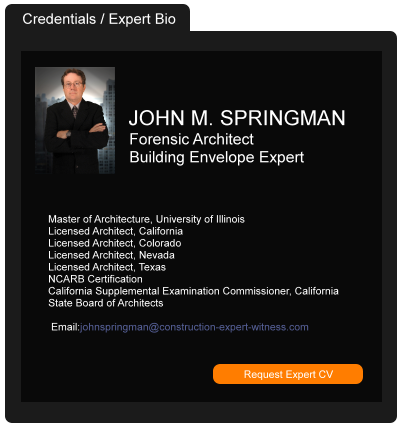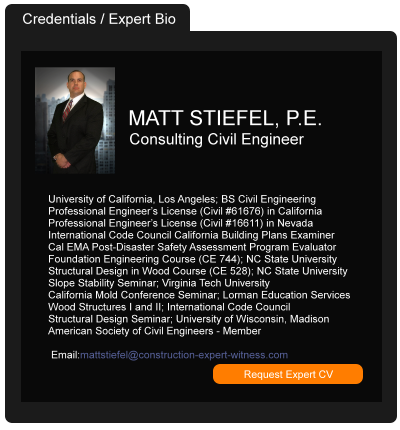Gillotti v. Stewart (2017) 2017 WL 1488711 Rejects Liberty Mutual, Holding Once Again that the Right to Repair Act is the Exclusive Remedy for Construction Defect Claims
November 21, 2017 —
Richard H. Glucksman, Esq. & Chelsea L. Zwart, Esq. - Chapman Glucksman Dean Roeb & Barger BulletinOriginally published by CDJ on June 5, 2017
Background
In Gillotti v. Stewart (April 26, 2017) 2017 WL 1488711, which was ordered to be published on May 18, 2017, the defendant grading subcontractor added soil over tree roots to level the driveway on the plaintiff homeowner’s sloped lot. The homeowner sued the grading subcontractor under the California Right to Repair Act (Civil Code §§ 895, et seq.) claiming that the subcontractor’s work damaged the trees.
After the jury found the subcontractor was not negligent, the trial court entered judgment in favor of the subcontractor. The homeowner appealed, arguing that the trial court improperly construed the Right to Repair Act as barring a common law negligence theory against the subcontractor and erred in failing to follow Liberty Mutual Insurance Co. v. Brookfield Crystal Cove LLC (2013) 219 Cal.App.4th 98. The Third District Court of Appeal disagreed and affirmed the trial court’s judgment in favor of the subcontractor.
Impact
This is the second time the Third District Court of Appeal has held that Liberty Mutual (discussed below) was wrongly decided and held that the Right to Repair Act is the exclusive remedy for construction defect claims. The decision follows its holding in Elliott Homes, Inc. v. Superior Court (Hicks) (2016) 6 Cal.App.5th 333, in which the Court of Appeal held that the Right to Repair Act’s pre-litigation procedures apply when homeowners plead construction defect claims based on common law causes of action, as opposed to violations of the building standards set forth in the Right to Repair Act. Elliott is currently on hold at the California Supreme Court, pending the decision in McMillin Albany, LLC v. Superior Court (2015) 239 Cal.App.4th 1132, wherein Liberty Mutual was rejected for the first time by the Fifth District. CGDRB continues to follow developments regarding the much anticipated McMillin decision closely, as well as all related matters.
Reprinted courtesy of
Richard H. Glucksman, Chapman Glucksman Dean Roeb & Barger and
Chelsea L. Zwart, Chapman Glucksman Dean Roeb & Barger
Mr. Glucksman may be contacted at rglucksman@cgdrblaw.com
Ms. Zwart may be contacted at czwart@cgdrblaw.com
Read the court decisionRead the full story...Reprinted courtesy of
Measure of Damages in Negligent Procurement of Surety Bonds / Insurance
September 04, 2018 —
David Adelstein - Florida Construction Legal UpdatesMy broker procured the wrong insurance and I am exposed to a loss. My broker failed to procure proper insurance and I am exposed to a loss. “Where the parties enter into an agreement to procure insurance and there is a negligent failure to do so, an insurance broker may be liable for damages.” The Lexington Club Community Association, Inc. v. Love Madison, Inc., 43 Fla.L.Weekly D1860a (Fla. 4th DCA 2018). The proper measure of damages in a negligent procurement of insurance claim is “what would have been covered had the insurance been properly obtained.” Id. quoting Gelsomino v. ACE Am. Ins. Co., 207 So.3d 288, 292 (Fla. 4th DCA 2016). This measure of damages in a negligent procurement of insurance claim is important because it is the measure of damages that dictates recoverable damages under this claim.
Read the court decisionRead the full story...Reprinted courtesy of
David Adelstein, Kirwin NorrisMr. Adelstein may be contacted at
dma@kirwinnorris.com
Concerns About On-the-job Safety Persist
August 13, 2019 —
Joanna Masterson - Construction ExecutiveNearly 40% of workers are more concerned with on-the-job safety this year than they were last year, according to a 360training.com survey of a thousand people across several manual labor-intensive industries. Additionally, a quarter of workers worry every day about getting injured because of their job. That number goes up to 27% for workers in the construction and oil industries.
Slips, trips and falls were the top workplace safety concern (36%), followed by electrical hazards (13%), ergonomic problems (9%), vehicle/equipment accidents (7%) and falling objects (6%). For the construction industry specifically, electrical hazards were identified as the leading cause of concern.
Reprinted courtesy of
Joanna Masterson, Construction Executive, a publication of Associated Builders and Contractors. All rights reserved.
Read the court decisionRead the full story...Reprinted courtesy of
2023 Executive Insights From Leaders in Construction Law
June 12, 2023 —
Construction ExecutiveIf a major project is interrupted or canceled, are there any laws that provide protection for unpaid contractors that have performed work?
Angela Richie
Partner, Co-Chair, Construction Practice Group
Gordon Rees Scully Mansukhani
With the current volatility and uncertainty in the economy, project interruptions and cancellations are on the rise; hence, you need to take steps now to make sure you have a method to get paid for the work you have performed.
For private projects, make sure you have followed the pre-lien notification requirements for the state in which the project is located before you start work, if they are required. Then, be sure to follow the lien notice and lien filing requirements for the state. Each state is different, so you want to be ready with the appropriate documentation in advance of the project interruption or cancellation.
Reprinted courtesy of
Construction Executive, a publication of Associated Builders and Contractors. All rights reserved.
Read the court decisionRead the full story...Reprinted courtesy of
New Jersey Supreme Court Holding Impacts Allocation of Damages in Cases Involving Successive Tortfeasors
March 28, 2022 —
Thomas Regan & Karley Kamaris - Lewis BrisboisNewark, N.J. (March 21, 2022) - Late in 2021, the Supreme Court of New Jersey addressed the issue of allocating damages in personal injury cases in which the plaintiff asserts claims against successive tortfeasors, such as medical malpractice in the treatment of a slip and fall injury caused by negligence. The decision in Glassman v. Friedel, 249 N.J. 199 (2021) overruled and replaced the long-held principles established in Ciluffo v. Middlesex General Hospital, 146 N.J. Super. 478 (App. Div. 1977) regarding successive liability. Ciluffo held that, when an initial tortfeasor settles before trial, the non-settling defendants in a successive tort were entitled to a pro tanto credit for the settlement amount against any damages assessed against them. The Superior Court of New Jersey Appellate Division in 2020, and the Supreme Court of New Jersey last year, abandoned that framework for one more consistent with statutory contribution law in the Garden State.
In Glassman v. Friedel, 465 N.J. Super. 436 (App. Div. 2020), the Appellate Division held that the application of the principles in Ciluffo in a negligence case has no support in modern jurisprudence, thus limiting its application. It rejected the holding in Ciluffo in light of the state legislature’s enactment of the Comparative Negligence Act, which requires juries to apportion damages between successive events and apportion fault among the parties responsible for each event. The appellate division went on to hold that a non-settling, successive tortfeasor may present proofs at trial as to the negligence of the settling tortfeasor, and that the burden of proof as to the initial tortfeasor’s negligence being the proximate cause of the second causative event indeed lies on the non-settling defendant. In sum, the appellate division in Glassman established steps the jury can use to determine successive tortfeasor liability, but largely treated it as one, attenuated incident.
Reprinted courtesy of
Thomas Regan, Lewis Brisbois and
Karley Kamaris, Lewis Brisbois
Mr. Regan may be contacted at Thomas.Regan@lewisbrisbois.com
Ms. Kamaris may be contacted at Karley.Kamaris@lewisbrisbois.com
Read the court decisionRead the full story...Reprinted courtesy of
Traub Lieberman Senior Trial Counsel Timothy McNamara Wins Affirmation of Summary Judgment Denial
August 28, 2023 —
Timothy G. McNamara - Traub LiebermanIn this appeal brought before the State of New York Appellate Division, Second Judicial Department, the court ruled in favor of Traub Lieberman’s client, a housing complex owner, affirming the denial of co-defendant landscaping company’s summary judgment motion seeking dismissal of the cross-claims asserted by the complex owner against the co-defendant.
In the underlying case, the plaintiff was allegedly injured when she slipped and fell on ice on the exterior stairs of the housing complex where she lived. The complex owner had contracted with the co-defendant to provide snow removal services for the complex. The plaintiff commenced action against both the complex owner and the landscaping company to recover damages for personal injuries. The complex owner asserted cross-claims against the landscaping company for contribution, common-law indemnification, and contractual indemnification. The landscaping company sought summary judgment dismissing the complaint and all cross-claims asserted against it, but the branch of the motion seeking dismissal of the cross-claims was denied. In the appeal brought before the Appellate Division, the court ruled in favor of Traub Lieberman’s client, the complex owner, affirming the denial of summary judgment for the cross-claims.
Read the court decisionRead the full story...Reprinted courtesy of
Timothy G. McNamara, Traub LiebermanMr. McNamara may be contacted at
tmcnamara@tlsslaw.com
CA Supreme Court Permits Insurers to Bring Direct Actions Seeking Reimbursement of Excessive Fees Against Cumis Counsel Under Limited Circumstances
August 19, 2015 —
David W. Evans & Valerie A. Moore – Haight Brown & Bonesteel LLPThe California Supreme Court held in Hartford Casualty Insurance Company v. J.R. Marketing, L.L.C. (Squire Sanders) (8/10/2015 - #S211645) that if Cumis counsel, operating under a court order which such counsel drafted and which expressly provided that the insurer would be able to recover excessive fees, sought and received fee payments from the insurer that were fraudulent or otherwise manifestly and objectively useless and wasteful when incurred, Cumis counsel have been unjustly enriched at the insurer’s expense and the insurer will be permitted under such limited circumstances to seek reimbursement directly from Cumis counsel.
Certain Hartford insureds who had been issued commercial general liability policies were sued in multiple proceedings for a variety of claims, including unfair competition, defamation and intentional misrepresentation. Hartford disclaimed a duty to defend or to indemnify the defendants on the grounds that the acts complained of occurred prior to Hartford’s policy, and that some of the defendants were not Hartford insureds. A coverage action was filed by some of the insureds against Hartford; they were represented by the Squire Sanders law firm. Although Hartford subsequently agreed to defend several of the defendants subject to a reservation of rights, it declined to pay defense expenses incurred prior to the date of such agreement. Some months later, the trial court entered a summary adjudication order, finding that Hartford had a duty to have defended the liability action on the date it was originally tendered; the order required Hartford to fund the insured’s defense with independent counsel (i.e., so-called “Cumis” counsel; see San Diego Federal Credit Union v. Cumis Insurance Society, Inc. (1984) 162 Cal.App.3d 358). The insureds retained Squire Sanders as their Cumis counsel.
Reprinted courtesy of
David W. Evans, Haight Brown & Bonesteel LLP and
Valerie A. Moore, Haight Brown & Bonesteel LLP
Mr. Evans may be contacted at devans@hbblaw.com
Ms. Moore may be contacted at vmoore@hbblaw.com
Read the court decisionRead the full story...Reprinted courtesy of
Utah’s Highest Court Holds That Plaintiffs Must Properly Commence an Action to Rely on the Relation-Back Doctrine to Overcome the Statute of Repose
August 20, 2018 —
Shannon M. Warren - The Subrogation StrategistEarlier this summer, in Gables & Villas at River Oaks Homeowners Ass’n v. Castlewood Builders LLC, 2018 UT 28, the Supreme Court of Utah addressed the question of whether the plaintiff’s construction defects claims against the general contractor for a construction project were timely-filed, or barred by the statute of repose. In Utah, the statute of repose requires that an action be “commenced within six years of the date of completion.” The plaintiff alleged that its 2014 amended complaint naming the general contractor as a defendant was timely-commenced because, before the date on which Utah’s statute of repose ran, a defendant filed a motion to amend its third-party complaint to name the general contractor as a defendant, and the defendant subsequently assigned its claims to the plaintiff. The plaintiff argued that the filing of its 2014 amended complaint related back[1] to the date of its original complaint. The Supreme Court disagreed, holding that an action is “commenced” by filing a complaint and that a motion for leave to amend does not count as “commencing” an action.
Read the court decisionRead the full story...Reprinted courtesy of
Shannon M. Warren, White and Williams LLPMs. Warren may be contacted at
warrens@whiteandwilliams.com


































































